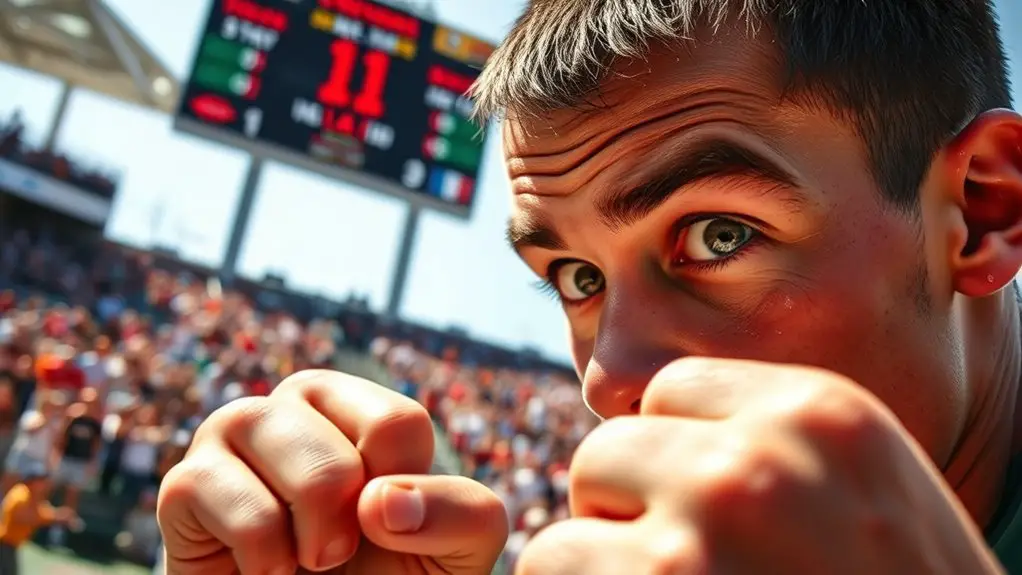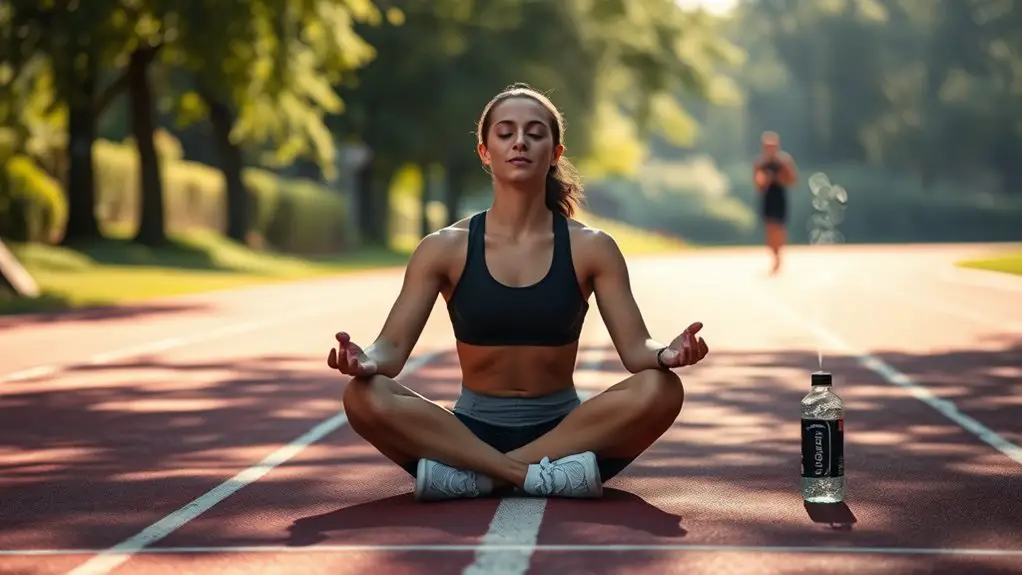Brain training can greatly improve your reaction time in sports by enhancing cognitive functions like decision-making, focus, and visual processing. Engaging in mental exercises such as quick decision scenarios, fast-paced games, and visualization techniques sharpens your reflexes and reduces cognitive load. This helps you respond faster in dynamic situations, giving you an edge over opponents. If you're curious about practical strategies and case studies of athletes who've benefited, there's plenty more to explore.
The Science Behind Reaction Time
While you might think of reaction time as simply how fast you can respond to a stimulus, it's actually a complex process involving several stages in the brain. Neuroscience research reveals that your brain processes information through sensory input, decision-making, and motor response. Each stage plays a crucial role in determining how quickly you can react.
When you see a ball coming toward you, your brain's cognitive function kicks in, analyzing the situation and deciding how to respond. This intricate interplay of brain activity influences your overall performance in sports. By understanding these processes, you can train your mind to enhance your reaction time. Incorporating mental conditioning techniques into your training can significantly boost your performance by sharpening your focus and awareness.
Brain training exercises can help streamline these stages, making your responses faster and more instinctive. Embracing this knowledge gives you the freedom to push your limits, releasing your athletic potential through improved reaction times and sharper cognitive skills.
Key Cognitive Skills Impacting Athletic Performance
When it comes to athletic performance, certain cognitive skills can make all the difference. You'll find that visual processing speed, decision-making agility, and the ability to focus and concentrate play essential roles in how well you perform. Enhancing these skills through brain training can give you a competitive edge. Additionally, cultivating focus in sports helps athletes tap into their true potential and enhances overall performance.
Visual Processing Speed
Visual processing speed is a critical cognitive skill that can greatly enhance your athletic performance. It's all about how quickly you can interpret what you see, allowing you to react faster in dynamic sports situations. With improved visual acuity, you'll notice finer details, helping you track the ball or an opponent's movements more effectively. Plus, boosting your cognitive flexibility means you can adapt your responses on the fly, making split-second decisions that can lead to victory. Brain training exercises targeting visual processing can sharpen these skills, empowering you to navigate the field with confidence. By honing this ability, you'll not only elevate your game but also experience the freedom to perform at your best.
Decision-Making Agility
Effective decision-making agility can make all the difference in sports, especially when split-second choices determine the outcome of a game. You need to harness your decision-making speed and cognitive flexibility to adapt quickly as the action unfolds. This agility allows you to assess situations, weigh options, and react appropriately, giving you an edge over your competition. Brain training exercises can enhance these skills, enabling you to process information faster and make sound judgments on the fly. By focusing on developing your mental agility, you'll find that not only does your performance improve, but you also feel freer and more confident in your abilities. Embrace this journey, and watch how your decision-making transforms your game.
Focus and Concentration
Although many factors contribute to athletic success, focus and concentration stand out as essential cognitive skills that can considerably impact your performance. When you sharpen your attention span, you reduce cognitive load, allowing your mind to react swiftly and effectively during competition.
Here are some key benefits of improved focus and concentration:
- Enhanced decision-making in high-pressure situations
- Increased ability to block out distractions
- Better memory retention of strategies and plays
- Faster reaction times due to quicker processing
Mental Exercises for Enhancing Reaction Time
To boost your reaction time in sports, incorporating mental exercises into your training routine can be incredibly beneficial. These exercises not only enhance cognitive flexibility but also improve memory retention, helping you respond more swiftly during competition. One effective method is practicing quick decision-making scenarios where you react to visual or auditory cues. This trains your brain to process information faster, allowing you to make split-second choices.
Another great exercise is playing fast-paced video games that require rapid responses. They challenge your brain while keeping it engaged, sharpening your reflexes in real-time. You might also try mindfulness meditation, which can enhance focus and clarity, ultimately leading to quicker reactions when it counts most. Additionally, regular meditation can promote mental clarity and reduce stress, creating an optimal environment for your brain to react instinctively. Remember, the goal is to create a mental state that allows you to act instinctively, so mix these exercises into your routine, and you'll likely see improvements in your game.
The Role of Visualization Techniques
Visualization techniques can greatly boost your reaction time in sports. By practicing mental imagery, you can enhance your focus and simulate game scenarios, allowing you to react more effectively during actual play. Additionally, these techniques improve muscle memory and coordination, enabling you to perform instinctively under pressure. Let's explore how these practices can sharpen your mind and improve your performance on the field.
Mental Imagery Practices
When athletes incorporate mental imagery practices into their training routines, they often find it enhances their overall performance, including reaction time. By engaging in techniques like mental rehearsal and cognitive visualization, you can create vivid mental scenarios that prepare your mind and body for competition. Here's how these practices can benefit you:
- Visualize successful plays and movements to boost confidence.
- Use mental rehearsal to prepare for specific scenarios in your sport.
- Enhance muscle memory by imagining your body's movements in detail.
- Reduce anxiety by mentally maneuvering through high-pressure situations.
These techniques allow you to tap into your potential, helping you react faster and perform better. Embrace the freedom of your imagination—it's a powerful tool for athletes!
Enhancing Focus and Concentration
While you might think of focus and concentration as inherent traits, they can actually be cultivated through visualization techniques. By incorporating specific focus techniques and concentration exercises into your routine, you can enhance your mental clarity and performance on the field.
Here's a quick table to help you visualize effective methods:
| Technique | Description | Benefits |
|---|---|---|
| Guided Imagery | Mentally rehearsing scenarios | Improves focus |
| Positive Affirmations | Repeating empowering phrases | Boosts confidence |
| Mindfulness | Staying present in the moment | Reduces distractions |
| Goal Visualization | Envisioning success achieving goals | Enhances motivation |
| Deep Breathing | Regulating breath for calm focus | Increases concentration |
Embrace these techniques, and you'll find your focus sharpened, leading to better performance.
Simulation of Game Scenarios
By simulating game scenarios in your mind, you can prepare yourself for the unexpected challenges of competition. Visualization techniques can enhance your performance through effective scenario training. When you engage in game simulations, you're not just imagining plays; you're building a mental toolkit. Here are some benefits you can gain:
- Improved decision-making: Anticipate opponent moves and react faster.
- Enhanced confidence: Familiarize yourself with high-pressure situations.
- Better focus: Sharpen your concentration on key plays.
- Reduced anxiety: Visualize success to calm pre-game nerves.
Incorporating these techniques into your training routine allows you to embrace the freedom of creativity and adaptability, making you a more formidable competitor on the field.
Incorporating Brain Training Into Your Routine
Incorporating brain training into your routine can greatly enhance your reaction time and overall performance in sports. By engaging in exercises that focus on cognitive fitness, you're tapping into the powerful neuroplasticity benefits your brain offers. Start with simple drills that challenge your focus and decision-making, such as reaction time apps or memory games. This not only sharpens your mental agility but helps your brain adapt and strengthen neural pathways.
Set aside just a few minutes each day for these activities—it's about quality, not quantity. You can easily fit brain training into your warm-up or cooldown sessions. Remember, as you improve your mental skills, you'll notice a ripple effect in your physical performance. So, embrace this freedom to explore new ways of training your mind and watch how it transforms your game. Make brain training an essential part of your athletic journey.
Case Studies: Athletes Who Benefited From Brain Training
Numerous athletes have experienced significant improvements in their performance through dedicated brain training. Their stories highlight how cognitive conditioning can enhance reaction times and overall athletic ability. Here are some key athlete testimonials and training comparisons that showcase these benefits:
- A professional soccer player reported a 30% increase in reaction speed after just a few months of brain training.
- A competitive swimmer noted improved decision-making skills, leading to faster race times.
- A basketball player found that cognitive drills helped him anticipate opponents' moves better, resulting in more steals.
- A track athlete experienced fewer mental blocks during races, attributing this to enhanced focus from brain training.
These examples illustrate that brain training isn't just a trend; it's a powerful tool for athletes seeking freedom to reach their full potential on the field, court, or track. Additionally, incorporating techniques for effective self-talk can further enhance an athlete's performance by boosting confidence and focus. With dedication, you too can harness these benefits and elevate your performance.
Future Trends in Sports and Cognitive Training
As the world of sports continues to evolve, the integration of cognitive training is poised to become a cornerstone of athletic development. You're likely to see an explosion in the use of virtual reality and wearable technology, transforming how athletes train their minds and bodies. With VR, you can immerse yourself in simulated game scenarios, honing your decision-making skills without the physical toll. Wearable tech, on the other hand, tracks your cognitive performance in real-time, allowing you to fine-tune your training regimen based on accurate data. Moreover, VR training helps enhance decision-making skills in high-pressure situations, further solidifying its role in athlete preparation.
As these tools become more accessible, you'll find the freedom to customize your training experience, making it uniquely yours. Imagine training not just your muscles but also your mental agility, giving you an edge over your competition. Embracing these trends means you're not just keeping up with the game; you're redefining how athletes prepare for success in sports.
Frequently Asked Questions
Can Brain Training Benefit Non-Athletes as Well?
Absolutely, brain training can benefit non-athletes too! By engaging in activities that enhance mental agility, you're not just sharpening your focus but also gaining valuable cognitive benefits. These improvements can help you in everyday tasks, from problem-solving to decision-making. Whether you're tackling work challenges or just enjoying hobbies, brain training can give you the freedom to think more clearly and react more quickly, enhancing your overall quality of life.
How Long Does It Take to See Improvement?
When you're trying to turn over a new leaf, you might wonder how long it'll take to see improvement. You could notice short term progress in just a few weeks, as your brain starts to adapt. However, for those lasting, long term effects, it might take a couple of months or more. Stay patient and consistent, and you'll find that the journey to improvement can feel liberating and rewarding!
Are There Any Risks Associated With Brain Training?
When considering brain training, it's essential to recognize potential risks. You might experience brain fatigue if you push yourself too hard, so it's important to balance your training. Overtraining risks can lead to diminished cognitive performance rather than improvement. Make sure you're giving yourself enough time to rest and recover. Embracing this freedom to step back can lead to more effective training and better results in the long run.
What Age Is Best to Start Brain Training?
The ideal age to start brain training often varies, but many experts suggest that early childhood is vital for cognitive development. When you engage in brain training during these formative years, you're tapping into a period of incredible growth. However, it's never too late to start! As long as you're willing to embrace new challenges, you can enhance your cognitive abilities at any age, giving you the freedom to excel in various aspects of life.
Do Different Sports Require Different Brain Training Methods?
You wouldn't train for a marathon the same way you'd prep for a chess match, right? Different sports do require different brain training methods. For instance, sport-specific techniques focus on the unique mental demands of each game. While soccer might emphasize spatial awareness, basketball could hone in on quick decision-making. By developing your cognitive agility tailored to your sport, you'll release your full potential and enjoy the freedom of peak performance.




